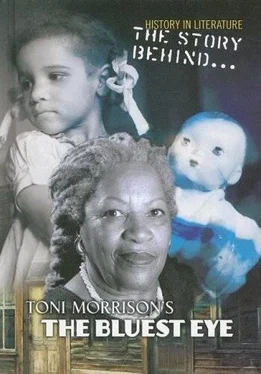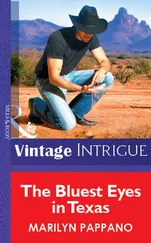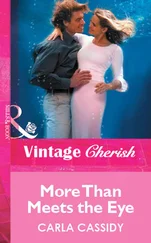
Toni Morrison
The Bluest Eye
To the two who gave me life and the one who made me free
Here is the house. It is green and white. It has a red door. It is very pretty. Here is the family. Mother, Father, Dick, and Jane live in the green-and-white house. They are very happy. See Jane. She has a red dress She wants to play. Who will play with Jane? See the cat. It goes meow-meow. Come and play. Come play with Jane. The kitten will not play. See Mother. Mother is very nice. Mother, will you play with Jane? Mother laughs. Laugh, Mother, laugh. See Father. He is big and strong. Father, will you play with Jane? Father is smiling. Smile, Father, smile. See the dog. Bowwow goes the dog. Do you want to play with Jane? See the dog run. Run, dog, run. Look, look. Here comes a friend. The friend will play with Jane. They will play a good game. Play, Jane, play.
Here is the house it is green and white it has a red door it is very pretty here is the family mother father dick and jane live in the green-and-white house they are very happy see jane she has a red dress she wants to play who will play with jane see the cat it goes meow-meow come and play come play with jane the kitten will not play see mother mother is very nice mother will you play with jane mother laughs laugh mother laugh see father he is big and strong father will you play with jane father is smiling smile father smile see the dog bowwow goes the dog do you want to play do you want to play with jane see the dog run run dog run look look here comes a friend the friend will play with jane they will play a good game play jane play
Hereisthehouseitisgreenandwhiteithasareddooritisveryprettyhereisthefa milymotherfatherdickandjaneliveinthegreenandwhitehousetheyareveryh appyseejaneshehasareddressshewantstoplaywhowillplaywithjaneseetheca titgoesmeowmeowcomeandplaycomeplaywithjanethekittenwillnotplays eemothermotherisverynicemotherwillyouplaywithjanemotherlaughslau ghmotherlaughseefatherheisbigandstrongfatherwillyouplaywithjanefatherissmilingsmILefathersmileseethedogbowwowgoesthedogdoyouwantto playdoyouwanttoplaywithjaneseethedogrunrundogrunlooklookherecom esafriendthefriendwillplaywithjanetheywillplayagoodgameplayjaneplay
Quiet as it's kept, there were no marigolds in the fall 1941. We thought, at the time, that it was because Pecola was having her father's baby that the marigolds did not grow. A little examination and much less melancholy would have proved to us that our seeds were not the only ones that did not sprout; nobody's did. Not even the gardens fronting the lake showed marigolds that year. But so deeply concerned were we with the health and safe delivery of Pecola's baby we could think of nothing but our own magic: if we planted the seeds, and said the right words over them, they would blossom, and everything would be all right. It was a long time before my sister and I admitted to ourselves that no green was going to spring from our seeds. Once we knew, our guilt was relieved only by fights and mutual accusations about who was to blame. For years I thought my sister was right: it was my fault. I had planted them too far down in the earth. It never occurred to either of us that the earth itself might have been unyielding. We had dropped our seeds in our own little plot of black dirt just as Pecola's father had dropped his seeds in his own plot of black dirt. Our innocence and faith were no more productive than his lust or despair. What is clear now is that of all of that hope, fear, lust, love, and grief, nothing remains but Pecola and the unyielding earth. Cholly Breedlove is dead; our innocence too. The seeds shriveled and died; her baby too.
There is really nothing more to say-except why. But since why is difficult to handle, one must take refuge in how.
Nuns go by as quiet as lust, and drunken men with sober eyes sing in the lobby of the Greek hotel. Rosemary Villanucci, our next-door friend who lives above her father's cafe, sits in a 1939 Buick eating bread and butter. She rolls down the window to tell my sister Frieda and me that we can't come in. We stare at her, wanting her bread, but more than that wanting to poke the arrogance out of her eyes and smash the pride of ownership that curls her chewing mouth. When she comes out of the car we will beat her up, make red marks on her white skin, and she will cry and ask us do we want her to pull her pants down. We will say no.
We don't know what we should feel or do if she does, but whenever she asks us, we know she is offering us something precious and that our own pride must be asserted by refusing to accept. School has started, and Frieda and I get new brown stockings and cod-liver oil. Grown-ups talk in tired, edgy voices about Zick's Coal Company and take us along in the evening to the railroad tracks where we fill burlap sacks with the tiny pieces of coal lying about. Later we walk home, glancing back to see the great carloads of slag being dumped, red hot and smoking, into the ravine that skirts the steel mill. The dying fire lights the sky with a dull orange glow. Frieda and I lag behind, staring at the patch of color surrounded by black. It is impossible not to feel a shiver when our feet leave the gravel path and sink into the dead grass in the field. Our house is old, cold, and green. At night a kerosene lamp lights one large room. The others are braced in darkness, peopled by roaches and mice. Adults do not talk to us-they give us directions. They issue orders without providing information. When we trip and fall down they glance at us; if we cut or bruise ourselves, they ask us are we crazy. When we catch colds, they shake their heads in disgust at our lack of consideration. How, they ask us, do you expect anybody to get anything done if you all are sick? We cannot answer them. Our illness is treated with contempt, foul Black Draught, and castor oil that blunts our minds. When, on a day after a trip to collect coal, I cough once, loudly, through bronchial tubes already packed tight with phlegm, my mother frowns. "Great Jesus. Get on in that bed. How many times do I have to tell you to wear something on your head? You must be the biggest fool in this town. Frieda? Get some rags and stuff that window." Frieda restuffs the window. I trudge off to bed, full of guilt and self-pity. I lie down in my underwear, the metal in my black garters hurts my legs, but I do not take them off, for it is too cold to lie stockingless. It takes a long time for my body to heat its place in the bed. Once I have generated a silhouette of warmth, I dare not move, for there is a cold place one-half inch in any direction. No one speaks to me or asks how I feel. In an hour or two my mother comes. Her hands are large and rough, and when she rubs the Vicks salve on my chest, I am rigid with pain. She takes two fingers' full of it at a time, and massages my chest until I am faint. Just when I think I will tip over into a scream, she scoops out a little of the salve on her forefinger and puts it in my mouth, telling me to swallow. A hot flannel is wrapped about my neck and chest. I am covered up with heavy quilts and ordered to sweat, which I do-promptly. Later I throw up, and my mother says, "What did you puke on the bed clothes for? Don't you have sense enough to hold your head out the bed?
Now, look what you did. You think I got time for nothing but washing up your puke?" The puke swaddles down the pillow onto the sheet-green-gray, with flecks of orange. It moves like the insides of an uncooked egg. Stubbornly clinging to its own mass, refusing to break up and be removed. How, I wonder, can it be so neat and nasty at the same time? My mother's voice drones on.
Читать дальше












